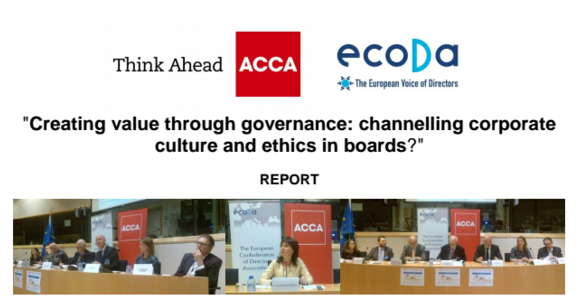Corporate governance is again under the spotlight in the UK after recent scandals at Sports Direct and BHS. Corporate responsibility is a hot topic in policy circles, resulting in the parliamentary inquiry and the Government's recently published UK Corporate Governance Green Paper. Will Theresa May move forward with her bold promises of reform? What are the key principles for a new model?
Summary of the discussion available here
Speakers:
- Iain Wright MP, Chair of the Business, Energy and Industrial Strategy Committee, UK Parliament (Keynote)
- Stefan Stern, Director of the High Pay Centre and FT columnist
- Marilyn Croser, Director at CORE Coalition
- George Dallas, Policy Director at the International Corporate Governance Network (ICGN)
- Janet Williamson, Senior Policy Officer at Trades Union Congress (TUC)
- Stephen Hockman QC, Head of Chambers at Six Pump Court Chambers
- Colin Melvin, Chair of the Social Stock Exchange
- Charles Cotton, Performance and Reward adviser at the Chartered Institute of Personnel and Development (CIPD)
The discussion focused on three key topics: executive pay, fiduciary duties and stakeholder engagement. The discussants equally examined how recent calls for a change in various aspects of the corporate governance system are connected to a broader rethink of governance models.
Background briefing
In September 2016, the parliamentary Business, Energy, and Industrial Strategy (BEIS) Committee launched an inquiry on corporate governance, concentrating on (1) executive pay, (2) directors duties, and (3) the composition of boardrooms, including worker representation and gender balance in executive positions.
The Department for Business, Energy and Industrial Strategy subsequently published a Green Paper to “stimulate a debate on a range of options for strengthening the UK’s corporate governance framework, including options for increasing shareholder in uence over executive pay and strengthening the employee, customer and supplier voice at boardroom level.”
The event addressed three key topics examined by the parliamentary inquiry and the Green Paper:
- fiduciary duties
- stakeholder engagement
- executive pay
The discussants equally examined how recent calls for a change of the corporate governance system are connected to a broader rethink of governance models in post-Brexit Britain and whether they can help to address inequality.
The event builds on the results of a global series of roundtables on corporate governance hosted by Cass Business School and Frank Bold between 2014 and 2016.
Directors duties
Is company law sufficiently clear on the roles of directors and non-executive directors, and are those duties the right ones?
Company directors have fiduciary duties to make decisions that are in the best interest of the company, which are codified in sections 170-177 of the Companies Act 2006. Section 172 entrenches the so-called principle of enlightened shareholder value, requiring that directors act in the way that would be most likely to promote the success of the company for the benefit of its members as a whole, and in doing so have regard (amongst other matters) to the interests of specified stakeholders and wider issues.
The Green Paper notes that “[m]any companies and their boards recognise clearly the wider societal responsibilities they have and the enormous benefit they gain through wider engagement around their business activities. However, some have said that companies need to do more to reassure the public that they are being run, not just with an eye to the interests of the board and the shareholders, but with a recognition of their responsibilities to employees, customers, suppliers and wider society” (2.2). Perhaps the most significant challenge in this respect is the question of how boards should reconcile the often conflicting interests of shareholders versus other stakeholders, and versus the interests of the company itself.
Proposals that have been raised in the debate in the UK and worldwide include improved reporting by boards, clarifying the relationship between the success of the company and shareholders’ interests, and specifying the content of fiduciary duties with respect to environmental and social issues.
Stakeholder engagement
How can the interests of employees, customers and wider stakeholders be better taken into account at board level in large companies?
The Government put forward four options for stakeholder representation in the Green Paper: (i) create stakeholder advisory panels, (ii) designate existing non-executive directors to ensure that the voices of key interest groups, especially that of employees, are being heard at board level, (iii) appoint individual stakeholder representatives to company boards, and (iv) strengthen reporting requirements related to stakeholder engagement.
It was also asked whether any new stakeholder engagement requirements should be applied to certain forms of company or above a certain employee/size threshold. Equally, there is a debate whether stakeholder engagement should be on an entirely voluntary basis or rather legislative/code-based (i.e. either mandatory or comply or explain basis).
Executive pay
Should shareholders and/or employees have greater say on executive remuneration? Are changes to remuneration committees or new pay reporting requirements likely to be helpful?
Executive remuneration has been hotly debated for many years, starting from the Greenbury Committee in 1995 and the Government’s consultation in 1999. Since then, as the Green Paper points out, CEO pay in FTSE 100 companies has quadrupled and increased as a ratio of the average pay of full-time employees from 47:1 to 128:1.
There are two main approaches to engage with executive remuneration. The first is to see it as a principal-agent problem, whereby executive remuneration is the outcome of managers extracting value from the firm without any connection to their performance. The second is to argue that rising executive pay is problematic in the light of a social license for business. Executives are perceived by the general public to be drawing wages that are increasingly high relative to that of the average or median worker. The relation of this practice to rising inequality gives rise to social dissonance, and is frequently pointed to as a contributor to the return of populist politics.
The Green Paper focuses primarily on proposals to increase shareholder control over remuneration, with the exception of a proposal for remuneration committees to consult employees to develop their recommendation, and a proposal to disclose the pay ratio of executives to workers.
Other proposals that have been suggested in a broader debate include capping executive pay relative to average, median, or minimal salary; and making bonuses conditional on the sustained achievement of long-term goals, including ESG goals, R&D, employee and/or customer satisfaction, and economic performance.
Event series
This event is the first in a series of three on corporate governance held at Cass Business School in 2017. The next events covered the following topics:
-
Systemic Risks and Corporate Governance - Discussants identified how companies and their long-term investors can adapt to the challenges posed by climate change and a persistent low-yield investment environment.
-
Corporate Governance and Reporting - The last event discussed the evolution of corporate accounting practice and policy, taking into account the needs of long-term investors and an integrated approach to value creation, as well as provided guidance to companies on how to comply with a rapidly evolving regulatory environment.




















